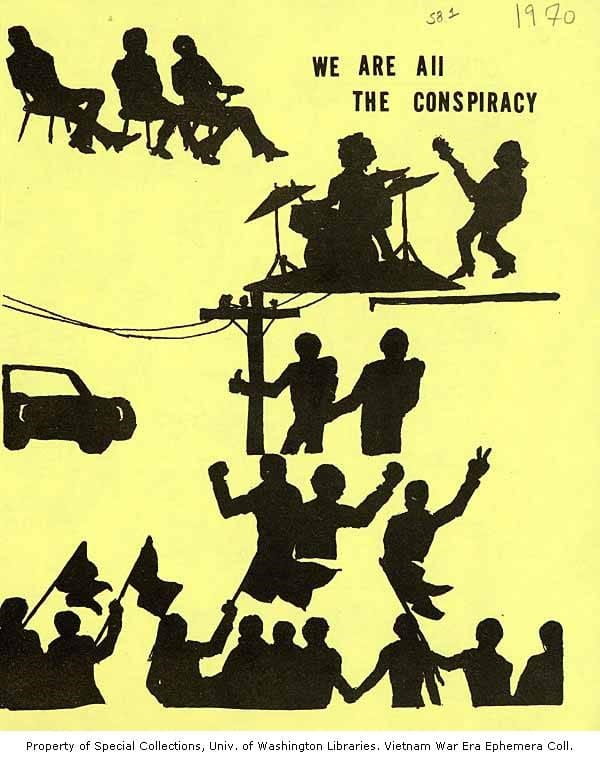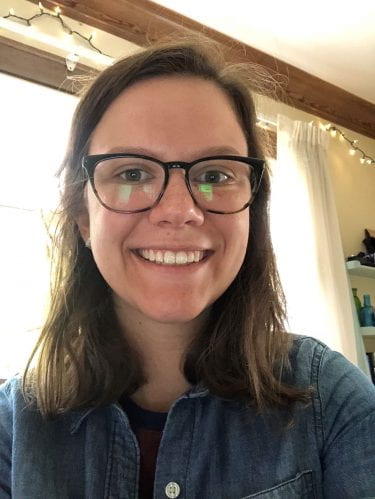August 12, 2020
Special Collections Library Launches New Digital Exhibit on Protest History in Seattle
For the last few months, I have been working on creating a new digital exhibit: We Are All The Conspiracy: The Day After Protest, Seattle 7, and Community Activism in 1970s Seattle, featuring material about the Seattle Liberation Front (SLF), a political group founded on the University of Washington’s campus in January 1970. Seven members of SLF were indicted by federal courts for their alleged role in conspiracy to incite a riot at The Day After protest (TDA) at the Federal Courthouse in Seattle.

Seattle Liberation Front and Young Socialist Alliance demonstration crowd, outside United States Courthouse, Seattle, February 17, 1970.
The final product is a far cry from where it began way back in early 2020—before COVID’s enormity was known and before the context of a Civil Rights movement ignited by the death of George Floyd and #BlackLivesMatter protests. I began planning to do an exhibit in October 2019 featuring material from Special Collections, but I was unsure what to feature. At the same time I was looking for exhibit ideas, I was also processing the Grant Haller Photograph Collection for the visual materials department and noticed a lot of photographs from protests and demonstrations. As I was processing the collection, I kept seeing material related to the Seattle Liberation Front and The Day After Protest. I was intrigued by how many years of coverage the protest and SLF received, especially considering that the SLF was only officially an organization from 1970 to 1971. After doing a quick dive into the history of SLF, I learned about the conspiracy charges leveled against the organizers by the federal government and the long court battle they faced. The initial goal of the exhibit was three-fold: to celebrate the protest’s 50th anniversary in 2020, to daylight some photographs from the newly-acquired Grant Haller photograph collection, and to contextualize how long the organizers and protesters dealt with the consequences of a single protest.
COVID-19 and #BlackLivesMatter both helped shape the digital exhibit into
a resource far beyond the original vision. A digital platform provided a more dynamic and accessible environment than would have been possible with a small display inside the Libraries. Preparing these materials while experiencing protests in our community and around the world, emphasized the critical need to document these activities and to continue to highlight collections that speak to revolutionary Black history to ensure adequate representation of historically underrepresented voices.
The Seattle Liberation Front
We Are All the Conspiracy uses a narrative approach accompanied with digitized images and flyers to walk viewers through the history of the Seattle Liberation Front. Images featured in the exhibit are from the Vietnam War Era Ephemera Collection, the Joe Karpen Photograph Collection, and the newly-acquired Grant Haller Photograph Collection.
SLF is most well-known for its role in The Day After Protest (TDA Protest) at the Seattle Federal Courthouse on February 17, 1970. The protest in Seattle was one of many coordinated protests in cities across the country protesting the sentencing of the Chicago 7 for conspiracy, inciting to riot at the 1968 Democratic National Convention, and for the treatment of Bobby Seale during his separate trial.

Political cartoon on a flyer for the Seattle Conspiracy Defense Fund, a group that supported the members of SLF charged with conspiracy to incite riot at The Day After Protest in Seattle on February 17, 1970.
Bobby Seale, a founding member of the Black Panther Party, had a separate trial from the Chicago 7. When Seale tried to represent himself in court, Judge Julius Hoffman ordered him to be bound and gagged for the remainder of the trial. Hoffman sentenced Seale to four years in jail for contempt of court. Protesters saw the conspiracy charges and the treatment of Bobby Seale as an attack on all people opposed to white supremacy and its wars—particularly the Vietnam War— and sought to stop the courts for a day as part of their demonstration.
In an ironic twist, leaders of SLF were charged with identical conspiracy to incite riot charges for their role in the TDA protest in downtown Seattle that ended in nearly 80 arrests and roughly $30,000 in property damage. One of the SLF leaders charged was University of Washington’s newest philosophy professor, Michael Lerner.
This digital exhibit explores the formation of SLF, the group’s activities and politics, the TDA protest and the resulting trial. For those following the current civil rights protests, there are many similarities and themes. Police brutality, inflated charges for protestors, concerns about “outside agitators”, police infiltration, and white people protesting in support of Black liberation are just some of the similarities between past and present protests.
Changing formats
The exhibit was created using WordPress rather than its initial plans for a small one case exhibit in Allen Library. Though the coronavirus made an in-person exhibit out of the question this year, using a digital format created new opportunities for reaching a wider audience and an opportunity to spotlight some of Special Collections’ digital materials. As a result, the exhibit contains over 30 photographs and over 8,000 words of text—much larger than a one exhibit case would have fit! The necessary format changes due to COVID also led to an opportunity to apply user-centered and universal design principles to this resource with a web format.
The exhibit has accessibility features that would not have been possible in the initial plans. As a result, the final product ended up being more equitable and accessible to people who would not have been able to visit an in-person exhibit and people with vision impairments and learning disorders. One of the best parts about universal design is that its payoff is for everyone, not just people with different accessibility needs. Not only did the shift to an online exhibit help support the needs of more people, but it also created a way for anyone with an internet connection or cell service to view the exhibit anytime and anyplace.
Relevance to today’s protests and organizing
Like the unplanned complications COVID presented to this project, the unplanned context of Civil Rights Protests in 2020 required some necessary and beneficial changes to the exhibit’s original plan.

Page one of a flyer from the Seattle 8 Defense Fund announcing a rally on November 8, 1970 to support the Seattle 7 as they stand trial for their role in The Day After Protest in Seattle on February 17, 1970.
We Are All the Conspiracy features a section called “Reflections on the Seattle 7 Today”. This section includes an acknowledgement of the similarities between activism in the 1970s and today, while recognizing that there are also crucial differences in identity and power, too: “This similarity is not an equivocation – the Murder of George Floyd and its resulting demonstrations are entirely different from the trial of seven white people in Seattle in 1970… However, they are both inseparably connected to the same mortal wounds in American culture and society – racism, white supremacy, imperialism, and state-sanctioned violence against political dissenters”.
“This similarity is not an equivocation – the Murder of George Floyd and its resulting demonstrations are entirely different from the trial of seven white people in Seattle in 1970… However, they are both inseparably connected to the same mortal wounds in American culture and society – racism, white supremacy, imperialism, and state-sanctioned violence against political dissenters”.
Connecting previous protesters’ ideologies and goals to the work of protestors and organizers today is important work to represent in our archives and collections. One of the Libraries’ strategic areas of focus is to enhance equitable environments for research, teaching and learning. We Are All The Conspiracy: The Day After Protest, Seattle 7, and Community Activism in 1970s Seattle is an example of how we are continuing to work to achieve our goals by elevating the voices of historically underrepresented communities at UW and in the Pacific Northwest and by partnering to create, preserve and increase access to culturally-relevant information resources.
As more people are requesting material about anti-racism and revolutionary history, it is vital that University of Washington’s archival collections are put to use to help draw connections between the past and present. In doing this, the Libraries are fostering an inclusive and respectful environment by listening and responding to the needs of our user communities.
Questions, Comments, or Changes
If you have any questions, comments, or would like to suggest changes or additions to the exhibit, emails can be directed to me, Abbey Maynard.
If you see any place for a link to this digital exhibit in any of the content you manage (whether it’s a lib guide, website, internal communications, Canvas course materials, or something else!) I’d love to talk to you about plugging/linking the exhibit there, too.
About the Author
Abbey Maynard is a 2020 graduate from the University of Washington’s Masters of Library and Information Science program, focusing primarily on archives and public services. Abbey worked for Special Collections as a Student Reference Assistant for a year and a half, and as a Visual Materials Student Assistant for the last year. As a student worker, Abbey provided reference assistance to patrons and processed visual materials collections. Abbey will continue to work at Special Collections this fall as an intern for the Labor Archives of Washington processing the RIDGE records, a new archival acquisition documenting coalition-led environmental activism in the Pacific Northwest. Her internship is sponsored by Northwest Archivists through their inaugural Archivist-in-Residence program.

